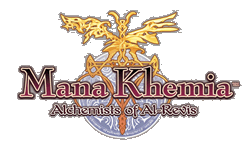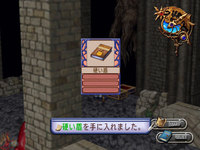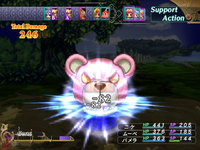|
|

|
PLATFORM
|
PS2
|
BATTLE SYSTEM
|

|
INTERACTION
|

|
ORIGINALITY
|

|
STORY
|

|
MUSIC & SOUND
|

|
VISUALS
|

|
CHALLENGE
|
Moderate to Easy
|
COMPLETION TIME
|
30-60 hours
|
|
OVERALL

|
Click here for scoring definitions
|
|
|
Mana Khemia: Alchemists of Al-Revis starts off its tenure on the PlayStation 2 with a bang, creating a unique experience mixed with interesting characters, but things start going downhill near the end. To say that this game is bad would be incorrect, though some portions of the game could have been changed to make the title slightly more enjoyable. For those that didn't run away crying after the first couple of sentences, Mana Khemia plays very similar to past Gust-developed games such as Atelier Iris and Ar tonelico, though this title expands greatly on both.
Starring an eclectic group of students, both new and old, Mana Khemia sets players on a floating island over a world that won't be set foot on. The group of characters that are placed in the player's care include a young boy named Vayne, a beast girl named Nikki, a pink-haired possible felon named Jessica, and Flay. Flay is the renter of a workshop that requires at least three people, which is where the three other characters come in, though over time the space will dwindle as more and more new members join. From a nice ghost to an alien with dubious plans, things definitely become more interesting around Al-Revis academy once these new arrivals pop in.
The game is not the most technologically advanced title on the market when it comes to graphics, though the cute character sprites and the colorful areas do fit the setting fairly well. There are many different areas to each map separated by a short loading transition. A few of the different maps include: the Al-Revis academy map, which allows players to choose where they would like to go from a list; the world map, which is similar to the previous; and the different area maps that allows players to wander around and explore.
 Recipe Get
Recipe Get
|
|
Enemies are all viewable on the map, and they appear as an amorphous blob that can be either reddish or purplish-blue. The former are groups of enemies specific to the area that players are exploring and their difficulty depends on a few different things. The larger and more imposing an enemy blob looks, the tougher the group will be to defeat. The time of the day, while not initially a problem, also changes the difficulty of enemy sets. During the day they just meander around slowly, whereas at night the enemies fly around much faster and are also tougher than their daytime counterparts. Players can use a button to slash at enemies in the field to get the heads up on them, but if the enemy hits the player first, then they get the upper hand. The purplish-blue enemies can be slashed during the day and sometimes leave items, but at night they can only be fought.
Players will notice that the most unique area of Mana Khemia is its lack of character levels, but this is all handled through the Grow Book. When players create new items through alchemy, they will want to go check the Grow Books for each character as there is a possibility that there is a socket for that item in there. Once an item is socketed on a character's Grow Book, players can use AP earned in battle to learn new skills, upgrade different stats, or just make them quicker at different skills. Due to the fact that many alchemy items can only be found later in the game, there isn't really a way for players to make the game any easier than the developers intended for it to be. Basically, if players find themselves stuck, it's not because the game is too tough or that their characters are underleveled, but rather a new strategy is needed.
The soundtrack is a huge reason for players to get hooked into the game. The music, which can be listened to through the "Extra" menu option, was composed by Ken Nakagawa and Daisuke Achiwa. As players progress through the game's twelve chapters, the music changes to fit the atmosphere. When it comes to sound effects, they won't blow anyone away with their realism. The main characters in the game are all voiced, but generally are only heard during very important events throughout the game.
 I Has Cheezburger Nao?
I Has Cheezburger Nao?
|
|
The most disappointing part of this game is that it could have been better than the final product ended up being due to the poor balancing of difficulty near the end of the game. To say the game was a cakewalk in the early portions of the game would be extreme, but a few of the game's chapters are frustrating. If it was easier to figure out the weaknesses of enemies in battle, that would be one thing, but some bosses have cleverly hidden weak points that must be discovered before the party quickly dies. These tough bosses really only feel difficult because they start getting overpowered as the game moves on, with huge amounts of health and skills that allow continuous attacks, which could easily dismember a decent party.
Battles in Mana Khemia are mostly straightforward with attacks, items, skills, defending, and running. However, there is a bar in the bottom corner that will initially confuse players as to its purpose, but as time goes on they will learn that it is the Burst gauge. What this entails is basically extra damage and a better chance of criticals and breaks when attacking enemies, at first. Eventually, players will unlock Finish Bursts, which is a second gauge that players can fill by doing certain actions once inside Burst mode. These actions are clearly pointed out on the screen and are generally easy things to accomplish such as "buff your allies" or "attack enemy's weakness."
The world of Mana Khemia revolves around Al-Revis academy, a school for up-and-coming alchemists, and this leaves plenty of room for players to explore both school assignments and free time. The game is essentially run by missions on a week to week, month to month, and year to year basis, with chapters being separated by school semesters and various breaks. Players will need to visit the student affairs office to accept either assignments for class or jobs during free time. School assignments generally have students go out in the field and either gather items to create an item through alchemy or to defeat an enemy.
Each chapter has a required number of credits that need to be earned to reach the event at the end, though if players are capable of completing the required amount early, then they are rewarded with more free time. This free time can be used by players however they wish. They can head to the dorm and sleep off the week, they can do various jobs such as defeating monsters or creating items for others, or they can go on character quests. During free time, players are able to talk to the different characters in their workshop and can go through various events with them. Doing these quests will, by the end of the game, determine the bonus ending that can be earned, depending on who the player interacted with the most during the entire game.
These bonus endings allow players to choose what sort of ending event they would like to visit, opening up new possibilities on replays. This leads to the new game + feature, which isn't explained in the menu. Once the player goes through the entire game, including the credits and bonus ending, they can save their progress. Loading this game save will take players back to the beginning of the game.
In the end, players that are looking for a unique RPG experience full of quirky characters, an interesting story with a few twists and turns, and exciting music, then Mana Khemia is the game for them. This is despite the few issues with the game's latter areas that force players to battle against enemies that can be frustratingly difficult to defeat, after being spoon-fed through most of the rest of the dungeon preceding it. Mana Khemia is a fun game despite its flaws, and will hit store shelves on March 31st.
Review Archives
|









